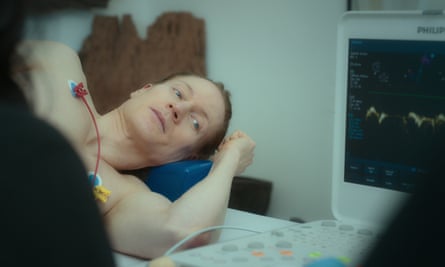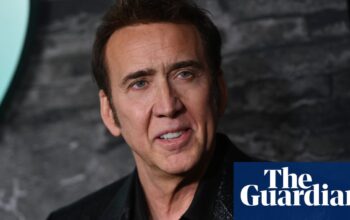Bryan Johnson, the biohacking centimillionaire who made a fortune selling payment apps, knows what his biggest online skeptics have been saying about him ever since he went viral in January 2023. Critics seized on the way he spends his days eating sludge and a jumble of vitamins and minerals (more than 50 a day) while wired up to devices monitoring his heart rate, brainwaves and erections (because they signal good health), and experimenting with far-out treatments like blood transfusions from his teenage son, all in an effort to slow the ageing process, live longer and, as his motto turned branded campaign says, Don’t Die.
“When I started, people were looking at me like this ‘eccentric, vampire billionaire tech bro drinking his son’s blood’,” says Johnson, on a video call with the Guardian. “I was like, ‘Sure, yes. Also, I’m a professional rejuvenation athlete. I’m creating a new sport and a new way to understand reality. Death is always inevitable, but I’m asking this question: are we the first generation that won’t die?”
Johnson, the 47-year-old subject behind the new Netflix doc, Don’t Die: The Man Who Wants to Live Forever, explains that he’s winning gold in the Olympics for health (if there were such a thing), claiming that he maintains the best biomarkers (like VO2 max – maximum oxygen consumption – and inflammation) in the world. He’s even built a website, rejuvenationolympics.com, where people can subscribe to testing kits that measure their speed of ageing and compete with others in the “community”. By following a militant diet, exercise and sleep regiment, Johnson claims to have reduced his speed of ageing to 0.64, meaning every year he only ages seven and a half months. He’s currently being outranked on his own leaderboard by a handful of subscribers.
Johnson says he’s feeling pumped as he enters the video call from his LA home. He had gotten off the elliptical just 10 minutes before, finishing off an hour-long 4×4 training regimen (where you train as hard as you can and rest in four-minute intervals), achieving a new personal best. “See those spikes,” he says, as he holds up his phone, showing a graph measuring his performance; and a report that his max heart rate of 189 shows a biological age of 31, and his muscle oxygen saturation and VO2 max is elite status for an 18-year-old. Before that, Johnson says he did 90 minutes of hyperbaric oxygen therapy, in which you lie in an imposing pod that delivers pure, pressurized oxygen to the body. And got yet another 100% sleep score, a result most of us living like we’re “addicted to die”, as Johnson says, could only dream of.
He’s referring to the things we think make us happy, the pizza, beer and staying out late that interferes with your optimal health and advances ageing, the things he’s entirely stripped from routine, which often makes the rest of us wonder whether a longer life on those terms is even worth living.
“Personally, I’ve never been happier,” says Johnson. “I personally have never known someone really healthy, and they’re like, ‘You know what, goddamn it, I’m too healthy. I just feel terrible’ … I think it’s really a rich commentary on the state of our cultural play that I would have to be on the defense stand justifying why healthy is good and why everyone else doing these death-encouraging practices are the ones that are living life. Really, it’s a paradigm shift. How to understand the world.”
Johnson’s basic health goals are, of course, far more relatable than his tech guru aura suggests. Take away the experimentation he has since abandoned with blood transfusions and rapamycin (a drug that has extended the lifespan in mice), the light and oxygen treatments that only people in his stratosphere can afford, the team of doctors studying his results and the brain measurement technology Kernel that Johnson himself developed. You ultimately have a health and lifestyle influencer who has branded and marketed his personal routine, which he calls Blueprint, much like any other you’ll scroll past on Instagram.
“Most of the benefit that Bryan receives from this endeavor is through sleep, diet and exercise,” says Chris Smith, the director behind the documentary. “Those are things that are available to all of us in different degrees.”
Smith began filming in March 2023, soon after the viral moment when headlines announced Johnson was spending $2m a year to be 18 again. The director says that spending time with Johnson has motivated him to be more thoughtful and intentional with his own health since. “Ultimately, as Brian states in the movie, he’s trying to be on the outer edge to see what’s possible, so that maybe we can all benefit from that.”

But his documentary, which gets to know the man behind the clickbaiting headlines and social media posts boasting biometric data and night-time erection updates, also maintains a reasonable amount of skepticism. On the one hand, Johnson’s radical journey to find treatments that will defy ageing mirrors so many others who go down their own internet wormhole searching for health solutions that the medical establishment doesn’t have answers for, be it cures to chronic pains or aids for better sleep. “Our healthcare system just picks up the tail end when we actually are on death’s bed,” says Johnson, sharing his cynicism with an industry he says has been hijacked by special interests. “It’s not preventative at all. It’s not proactive at all.”
On the other hand, doctors and scientists who appear in Smith’s doc generally agree that Johnson’s experimentation with multiple treatments and therapies at once don’t make for sound science, since there’s no telling where the benefits are coming from.
When I ask Johnson why he doesn’t spend his millions on research that satisfies current scientific models within the healthcare system, he resists. For him, building a new system is more logical than improving the current one.
“It’s broken,” says Johnson, who says he’s in touch with politicians like Robert F Kennedy Jr and the presumptive deputy secretary of health and human services, Jim O’Neill, to repair laws that he argues gets in the way of scientific development. “It’s not just fixing the system. It’s fixing the zeitgeist.”
At this point, we take a step back and look at the bigger picture built around Johnson’s Don’t Die ethos, and how his carefully curated regimen and belief that we can expand our lifespans ties back to his work as a tech entrepreneur using AI to study and potentially improve the human body. For Johnson, Don’t Die is an ideology that merges the very human desire to live longer with scientific advances, a sci-fi-worthy synergy that he hopes will be gamechanging enough for the human species that it will put him on the map alongside Confucius and Karl Marx.
He says, “Don’t Die is political; economic; moral; social; ethical; religious; spiritual.
“At the same time, it’s computational. It’s basically built on physics … It’s an actual ideology that AI can implement.”
-
Don’t Die: The Man Who Wants to Live Forever is streaming on Netflix now
Source: theguardian.com


